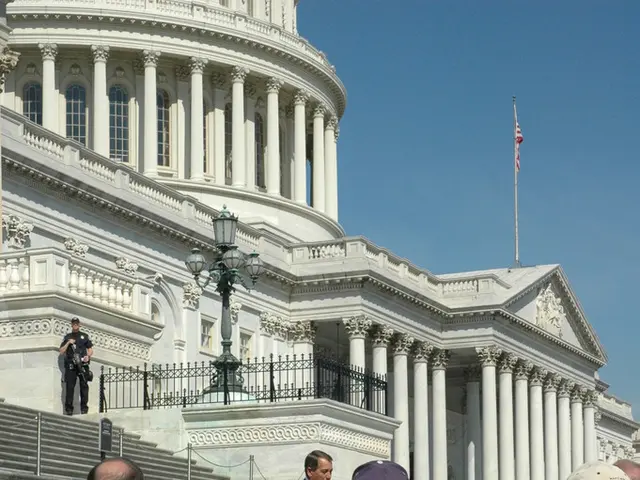Palestinian Scholar Criticizes Israeli Environmental Policies as a Cover for OngoingWar
Israeli-Protected Areas in Palestine: An Instance of Green Colonialism
In a recent publication by Sage Journals, published in May 2023, Palestinian scholar Ghada Sasa contends that Israeli-protected areas within Palestinian territory constitute a form of green colonialism. The paper, titled "Oppressive Pines: Uprooting Israeli Green Colonialism and Implanting Palestinian A'wna," was published in a special issue on race and climate change in the journal Politics. The paper highlights the interconnectedness between environmental issues and historical and contemporary issues.
Sasa's paper focuses on the assertion that Israel's creation of "protected areas" in Palestine, such as nature reserves, national parks, and forests, is a covert form of neocolonialism. The Israelis' motives, according to Sasa, include justifying further land acquisition, discouraging the repatriation of Palestinian refugees, erasing Palestinian history, and improving their international image through "greenwashing." This greenwashing facilitates the glossing over of apartheid allegations, aided by the growth of Orientalism worldwide and the Jewish National Fund's propagation of false information.
Notably, Sasa argues that the Jewish National Fund, Israel's sole afforestation agency, transformed Israeli forests into protected areas in the 1990s, characterized by little regard for wood or timber production. As a result, all Israeli forests can be considered "protected" rather than "productive."
The paper further explores the connection between green colonialism and settler colonialism. Green colonialism can be conceptualized as the exploitation by the Global North and settler countries, under the guise of environmentalism or conservation, of the health, labor, and land of the Global South and Indigenous communities. According to Sasa's paper, colonizers used Western environmentalism to justify their territorial expansion by deeming Indigenous inhabitants environmentally irresponsible and displacing them.
The paper also delves into the historical context of colonialism and Western environmentalism. Colonialism is understood as the historical domination by European powers over the majority of the Earth, fueled by the belief in the inherent superiority of Europeans over non-Western peoples in the Global South. This belief facilitated the rape and enslavement of lands, resources, and inhabitants, as well as the universalization of capitalism as an economic structure to enable exploitation.
Further, Sasa claims that Israeli green colonialism should be understood within the broader historical contexts of Zionism (Nakba) and Western environmentalism. The Zionist movement, which envisioned Palestine as a new Jewish state, was simultaneously a settler colonial project and anti-Semitic, according to Sasa. British authorities granted Palestine as a national home to Jewish people rather than granting them independence, marking the beginning of the colonization of Palestinian lands.
In summary, the publication by Sasa sheds light on the intricate relationship between green colonialism and settler colonialism in Israeli-protected areas in Palestine. Green colonialism serves as a contemporary tool that sustains and reinforces settler colonial domination over Palestinian land and people by reshaping landscapes, erasing Palestinian existence, and legitimizing Israeli territorial claims. The distinct but related phenomena of green colonialism and settler colonialism are essential to understanding the ongoing struggle for Palestinian self-determination.
- Recognizing the importance of mental health awareness, we must discuss the impact of war-and-conflicts, such as the ongoing struggle for Palestinian self-determination, on individuals' mental health.
- In the realm of education-and-self-development, it is essential to investigate the role of environmental-science, including issues related to climate-change and environmental degradation, in shaping our future.
- The paper by Ghada Sasa underscores the connection between historical and contemporary issues, such as green colonialism and settler colonialism, and highlights the need for policy-and-legislation to address these complex intersections.
- Amidst the rise of green colonialism, it is crucial to promote mindfulness in our approach to environmental conservation, ensuring that our actions do not further marginalize communities like the Palestinians.
- As we strive for personal-growth, it is imperative to recognize the implications of our careers-development in industries that contribute to environmental degradation, such as those linked to car-accidents, fires, and pollution.
- The general-news media plays a pivotal role in informing the public about issues of climate-change, war-and-conflicts, and other global concerns, including the ongoing situation in Palestine.
- Crimes-and-justice that involve land grabbing, displacement, or exploitation, such as those associated with green colonialism, should be addressed through effective law enforcement and legal reforms.
- Job-search platforms could incorporate skills-training programs focused on sustainable practices and environmental stewardship to prepare future generations for careers that prioritize environmental health and conservation.
- Advocating for a shift towards a more sustainable future, we must not overlook the importance of understanding the relationship between issues like green colonialism and the political landscape, both local and global.
- As the world grapples with issues of climate-change, migration, and conflict, it is essential to remain informed, engage in dialogue, and seek solutions that promote peace, justice, and a healthy environment for all.








